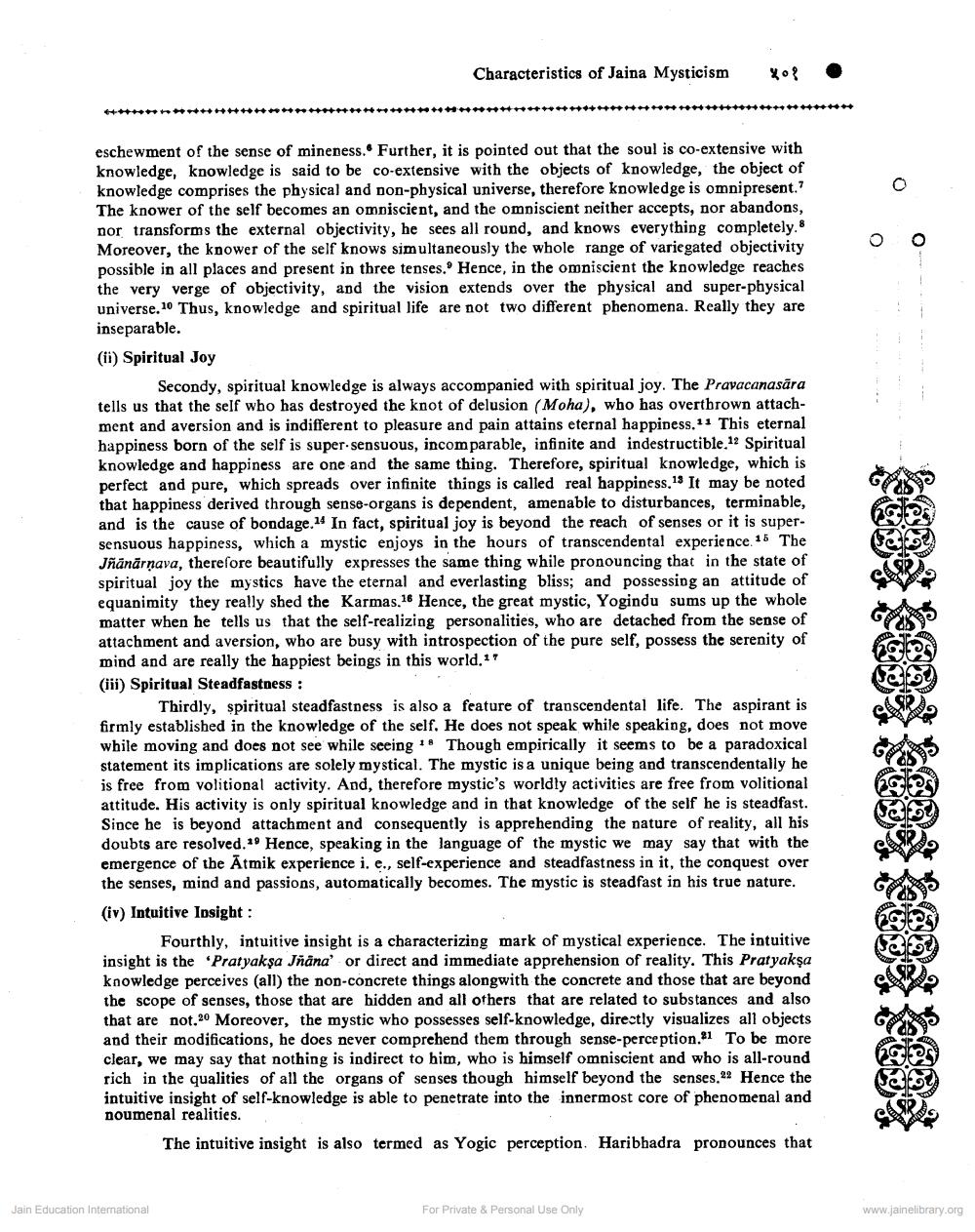________________
Characteristics of Jaina Mysticism ५०१
eschewment of the sense of mineness. Further, it is pointed out that the soul is co-extensive with knowledge, knowledge is said to be co-extensive with the objects of knowledge, the object of knowledge comprises the physical and non-physical universe, therefore knowledge is omnipresent." The knower of the self becomes an omniscient, and the omniscient neither accepts, nor abandons, nor transforms the external objectivity, he sees all round, and knows everything completely. Moreover, the knower of the self knows simultaneously the whole range of variegated objectivity possible in all places and present in three tenses. Hence, in the omniscient the knowledge reaches the very verge of objectivity, and the vision extends over the physical and super-physical universe. 10 Thus, knowledge and spiritual life are not two different phenomena. Really they are inseparable.
(ii) Spiritual Joy
Secondy, spiritual knowledge is always accompanied with spiritual joy. The Pravacanasara tells us that the self who has destroyed the knot of delusion (Moha), who has overthrown attachment and aversion and is indifferent to pleasure and pain attains eternal happiness.11 This eternal happiness born of the self is super-sensuous, incomparable, infinite and indestructible.12 Spiritual knowledge and happiness are one and the same thing. Therefore, spiritual knowledge, which is perfect and pure, which spreads over infinite things is called real happiness. 13 It may be noted that happiness derived through sense-organs is dependent, amenable to disturbances, terminable, and is the cause of bondage.14 In fact, spiritual joy is beyond the reach of senses or it is supersensuous happiness, which a mystic enjoys in the hours of transcendental experience. 15 The Jñānārṇava, therefore beautifully expresses the same thing while pronouncing that in the state of spiritual joy the mystics have the eternal and everlasting bliss; and possessing an attitude of equanimity they really shed the Karmas. 16 Hence, the great mystic, Yogindu sums up the whole matter when he tells us that the self-realizing personalities, who are detached from the sense of attachment and aversion, who are busy with introspection of the pure self, possess the serenity of mind and are really the happiest beings in this world. 17
(iii) Spiritual Steadfastness:
Thirdly, spiritual steadfastness is also a feature of transcendental life. The aspirant is firmly established in the knowledge of the self. He does not speak while speaking, does not move while moving and does not see while seeing 18 Though empirically it seems to be a paradoxical statement its implications are solely mystical. The mystic is a unique being and transcendentally he is free from volitional activity. And, therefore mystic's worldly activities are free from volitional attitude. His activity is only spiritual knowledge and in that knowledge of the self he is steadfast. Since he is beyond attachment and consequently is apprehending the nature of reality, all his doubts are resolved. 19 Hence, speaking in the language of the mystic we may say that with the emergence of the Atmik experience i. e., self-experience and steadfastness in it, the conquest over the senses, mind and passions, automatically becomes. The mystic is steadfast in his true nature. (iv) Intuitive Insight:
Fourthly, intuitive insight is a characterizing mark of mystical experience. The intuitive insight is the 'Pratyakşa Jnana' or direct and immediate apprehension of reality. This Pratyakṣa knowledge perceives (all) the non-concrete things alongwith the concrete and those that are beyond the scope of senses, those that are hidden and all others that are related to substances and also that are not.20 Moreover, the mystic who possesses self-knowledge, directly visualizes all objects and their modifications, he does never comprehend them through sense-perception. To be more clear, we may say that nothing is indirect to him, who is himself omniscient and who is all-round rich in the qualities of all the organs of senses though himself beyond the senses.22 Hence the intuitive insight of self-knowledge is able to penetrate into the innermost core of phenomenal and noumenal realities.
The intuitive insight is also termed as Yogic perception. Haribhadra pronounces that
Jain Education International
For Private & Personal Use Only
O
www.jainelibrary.org




